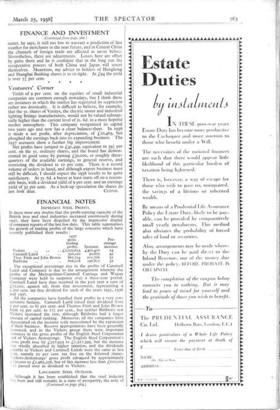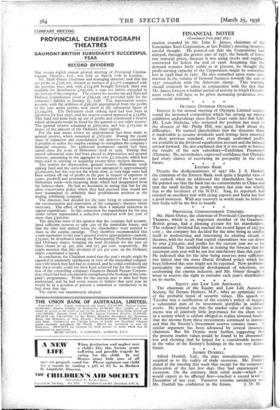FINANCIAL NOTES IMPRESSIVE STEEL PROFITS.
IF there were any doubts that the profit-earning capacity of the British iron and steel industries increased enormously during 1937, they have been dispelled by the impressive display of company reports of the last few days. This table summarises the growth of trading profits of the large concerns which have recently published their results :
1937 gross Per- trading tentage
profits. Increase. increase. Vickers L2,o2o,653 £401,410 24
Cammell Laird 306,100 90,870 42 Thos. Firth and John Brown 867,724 211,706 32 Baldwins .. 806,018 196,817 32 The exceptional percentage rise in the profits of Cammell Laird and Company is due to the arrangement whereby the profits of the Metropolitan-Cammell Carriage and Wagon Company were held in suspense over a three-year period.
Cammell Laird have thus received in the past year a sum of £75,000, .against nil, from that investment, representing. a
5 per cent. tax free dividend for each of the years 1935, 1936 and 1937.
All the companies have handled their profits in a very con-
servative fashion. Cammell Laird raised their dividend from 5 per cent. to 8f per cent. and Thomas Firth and John Brown
from 15 per cent. to 171 per. cent., but neither Baldwin nor Vickers increased the rate, although Baldwins had a larger amount of capital ranking. Moreover, all the companies have depreciated on the increase scale necessitated by the expansion
3f their business. Reserve appropriations have been generally increased, and in the Vickers group there were important increases in the gross profits of the English Steel Corporation
'id of Vickers Armstrongs. The English Steel Corporation's Toss profit rose by £257,953 to £1,317,399, but the increase as wholly absorbed in higher taxation, and the dividends ayable to Vickers and Cammell Lair& were the same as last car, namely 20 per cent. tax free- on the deferred shares. ickers-Armstrongs' gross profit advanced by approximately 250,000 to £1,965,556, but of this increase less than £roo,000 's passed over as dividend to Vickers.
LANCASHIRE STEEL OUTLOOK.
Although it has been established that the steel industry i'as been and still remains in a state of prosperity, the note of (Continued on page 564.)
FINANCIAL NOTES
- (Continued from page 563.) caution sounded by Mr. John E. James, chairman of the Lancashire Steel Corporation, at last Friday's meeting deserves careful thought. He pointed out that the Corporation had enjoyed, through the greater part of 1937, the benefit of lower raw material prices, because it was using stocks and supplies contracted for before the end of 1936. Assuming that the demand remains fairly stable as at present, he thought the profit-earning capacity of the Corporation might be somewhat less in 1938 than in 1937. He also remarked upon some con- traction in the volume of forward business towards the end of 1937 coincident with the American slump. This warning should evidently be taken in conjunction with the fact that Mr. James foresees a further period of activity in which Govern- ment orders will have to be given increasing preference over commercial demands.
* * * *











































































 Previous page
Previous page